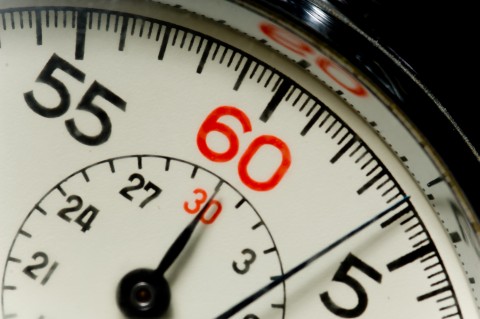
Telling time is part of everyday life. It’s one of the essential conversation skills you need to learn when studying a new language.
So how do you tell time in Korean?
Today, you’re going to learn many ways to address the time, including essential vocabulary for talking about the specific time with someone. By the end of this article, you should be more knowledgeable on Korean standard time and how to say the time in Korean! Let’s get started.
 Table of Contents
Table of Contents
- How to Ask for the Time
- How to Say “Hour” in Korean
- How to Say the Minutes in Korean
- Hours Divided into Minutes
- General Time Reference of the Day
- Time Adverbs in Korean
- Bonus: Time Proverbs and Sayings
- How KoreanClass101 Can Help You with Korean
1. How to Ask for the Time

1- 몇 시예요? (Myeot si-yeyo?)
몇 시예요? (Myeot si-yeyo?) literally means “What time is it?”
몇 (myeot) means “how many” or “which number,” and 시 (si) means “o’clock” or “time.”
So 몇 시 (myeot si) plus 예요 (yeyo), which means “it is,” becomes 몇 시예요? (Myeot si-yeyo?) or “What time is it?”
Example
- 지금 몇 시예요?
Jigeum myeot siyeyo?
“What time is it now?”
*The first word, 지금 (jigeum), means “now.”
2- ~는 몇 시에 있어요? (~neun myeot sie isseoyo?)
You can use this phrase when you want to ask a question about when a specific thing will happen, such as the departure time of a bus or airplane. In order to ask, you say ~는 몇 시에 있어요? (~neun myeot sie isseoyo?), which means “What time is ~?” Simply add a noun to the front to ask the question.
Examples
- 버스는 몇 시에 있어요?
Beoseu-neun myeot si-e isseoyo?
“What time is there a bus?”
- 기차는 몇 시에 있어요?
Gicha-neun myeot si-e isseoyo?
“What time is there a train?”
3- 몇 시에 ~? (myeot sie ~?)
If you want to know what time to meet someone or what time you’ll be doing something, you can put the verb indicating the action after saying 몇시에 (myeot si-e), meaning “at what time.”
Examples
- 몇 시에 만나요?
Myeot sie mannayo?
“What time will (we) meet?”
- 몇 시에 먹어요?
Myeot sie meogeoyo?
“What time will (we) eat?”
- 몇 시에 가요?
Myeot sie gayo?
“What time will (we) go?”

2. How to Say “Hour” in Korean
In Korea, Korean people tend to give the time using the twelve-hour clock, especially when speaking. However, it really depends on the person. Some may prefer to use the twenty-four-hour clock instead.
1- ~시예요. (~siyeyo.)
To say that “It’s ten o’clock” in Korean, the rule is very simple. Add the number, in this case 열 (yeol) which means “ten,” followed by 시 (si) which means “o’clock” and 입니다 (imnida) which means “it is.” So the whole sentence becomes 열시 입니다 (yeolsi imnida).
Have a look at the table below to practice the hours in Korean.
2- Hours in Korean
*Click on each Korean word to practice the pronunciation!
| Korean | Romanization | English |
|---|---|---|
| 한 시 | hansi | 1 o’clock |
| 두 시 | dusi | 2 o’clock |
| 세 시 | sesi | 3 o’clock |
| 네 시 | nesi | 4 o’clock |
| 다섯 시 | daseotsi | 5 o’clock |
| 여섯 시 | yeoseotsi | 6 o’clock |
| 일곱 시 | ilgopsi | 7 o’clock |
| 여덟 시 | yeodeolsi | 8 o’clock |
| 아홉 시 | ahopsi | 9 o’clock |
| 열 시 | yeolsi | 10 o’clock |
| 열한 시 | yeolhansi | 11 o’clock |
| 열두 시 | yeoldusi | 12 o’clock |
Check out 한국 숫자 (hanguk sutja) on KoreanClass101 to practice numbers in Korean.
Examples
- 지금 몇시에요?
Jigeum myeotsieyo?
“What time is it now?”
- 지금은 12시예요. (formal – speaking)
Jigeumeun yeoldusiyeyo.
“It’s 12 o’clock.”
- 지금은 12시입니다. (formal – writing)
Jigeumeun yeoldusiimnida.
“It’s 12 o’clock.”
- 지금은 12시야. (casual – speaking)
Jigeumeun yeoldusiya.
“It’s 12 o’clock.”
3. How to Say the Minutes in Korean

1- ~ 시 ~ 분 (~ si ~ bun)
“Minute(s)” is 분 (bun) in Korean. When you want to write “how many minutes” in Korean, it’s 몇분 (myeotbun).
Let’s have a look at a number of examples:
| Korean | Romanization | Translation |
|---|---|---|
| 5분 (오분) | 5bun (obun) | “Five minutes” |
| 10분 (십분) | 10bun (sipbun) | “Ten minutes” |
| 20분 (이십분) | 20bun (isipbun) | “Twenty minutes” |
| 35분 (삼십오분) | 35bun (samsibobun) | “Thirty-five minutes” |
| 42분 (사십이분) | 42bun (sasibibun) | “Forty-two minutes” |
| 51분 (오십일분) | 51bun (osibilbun) | “Fifty-one minutes” |
| 59분 (오십구분) | 59bun (osipgubun) | “Fifty-nine minutes” |
Example
- 지금 몇시에요?
Jigeum myeotsieyo?
“What time is it now?”
- 열시 사십오분이예요.
Yeolsi sasibobuniyeyo.
“It’s 10:45.”
4. Hours Divided into Minutes
When learning how to read time in Korean, it’s important that you know how to talk about the minutes past the hour. Here are a couple of the most common time phrases in Korean for this.
1- ~분 전 (~bun jeon)
전 (jeon) means “ago.” To say “thirty minutes ago,” as you may have already guessed, you would write this as 30분 전 (samsipbun jeon). Let’s have a look at more examples below.
Examples
- 삼십분 전에 일어났어요.
Samsipbun jeone ireonasseoyo.
“I woke up thirty minutes ago.”
- 어? 지민이 한 이십 분 전에 나갔는데요?
Eo? Jimini han isip bun jeone naganneundeyo?
“Ah? Jimin left (the house) about twenty minutes ago.”
- 십오분 전
sibobun jeon
“Twenty-five minutes ago”
2- ~분 후 (~bun hu)
후 (hu) means “after.” To say “after thirty minutes,” you would write it as 30분 후 (samsipbun hu). Let’s have a look at more examples below. Keep in mind that ~분 뒤 (~bun dwi) is frequently used in speaking as well.
Examples
- 삼십분 후에 전화할께.
samsipbun hue jeonhwahalkke.
“I will give you a call after thirty minutes.”
- 10분뒤에 좀 쉬자.
sipbundwie jom swija.
“Let’s take a rest after ten minutes.”

5. General Time Reference of the Day
1- 오전 / 오후 (ojeon / ohu)
Meaning
- 오전 (ojeon) means “morning.”
- 오후 (ohu) means “afternoon.”
Examples
- 나 오전 내내 집에만 있었어.
Na ojeon naenae jibeman isseosseo.
“I stayed home all morning.”
- 다음 주 월요일 오후에 시간 돼? 저녁이라도 같이 먹자.
Daeum ju wollyoil ohue sigan dwae? Jeonyeogirado gachi meokja.
“Are you free next Monday afternoon? Let’s grab something to eat.”
2- 아침 / 저녁 (achim / jeonyeok)
Meaning
- 아침 (achim) means “morning.”
- 저녁 (jeonyeok) means “evening.”
Examples
- 아침부터 계속 비가 오고 있네.
Achimbuteo gyesok biga ogo inne.
“It has been raining since morning.”
- 미안, 오늘 저녁 늦게까지 일해야해.
Mian, oneul jeonyeok neutgekkaji ilhaeyahae.
“Sorry, I have to work late this evening.”
3- 오전 (ojeon) Vs. 아침 (achim) & 오후 (ohu) Vs. 저녁 (jeonyeok)
I’m sure you’re confused by these word pairs. They both have the same meaning, “morning,” but 아침 (achim) refers to early morning, such as when you’re going to work or having breakfast. 오전 (ojeon) includes early morning until noon.
Examples
- 매일 아침 일찍 일어나서 운동하고 있어요.
Maeil achim iljjik ireonaseo undonghago isseoyo.
“I wake early in the morning and try exercising everyday.”
- 이 리포트를 오전까지 학교로 내야해요.
I ripoteureul ojeonkkaji hakgyoro naeyahaeyo.
“I have to submit this report in the morning (before 12pm).”
The difference between the second pair of words is similar to the explanation above. They both have the same translation in English, but the meanings are slightly different. 오후 (ohu) usually refers to the time between noon (we say this as jeongo in Korean) until five or six o’clock in the afternoon. 저녁 (jeonyeok) usually refers to late evening, such as the time when you have dinner, and it usually starts at about seven o’clock in the evening.
Examples
- 미안, 우리 몇 시에 만나기로 했지? 오후 3시였나?
Mian, uri myeot sie mannagiro haetji? ohu 3siyeonna?
“Sorry, what time were we supposed to meet today? Was it 15:00?”
- 내일 저녁에 같이 밥먹을래?
Naeil jeonyeoge gachi bammeogeullae?
“Are you free for dinner tomorrow evening?”
4- 밤 / 새벽 (bam / saebyeok)
Meaning
- 밤 (bam) means “evening.”
- 새벽 (saebyeok) means “dawn.”
Examples
- 어제 밤에 2시간밖에 못 자서 너무 피곤해.
Eoje bame 2siganbakke mot jaseo neomu pigonhae.
“I slept for only two hours last night so I feel tired.”
- 잠이 안와서 새벽 4시까지 깨어 있었어.
Jami anwaseo saebyeok nesikkaji kkaeeo isseosseo.
“I couldn’t sleep so I stayed up until 4:00 a.m.”
5- 정오 / 자정 (jeongo / jajeong)
Meaning
Examples
- 정오까지 일을 끝내보도록 하겠습니다. (formal – writing)
Jeongokkaji ireul kkeunnaebodorok hagetseumnida.
“I will try to finish the work by noon.”
- 자정이 지나면 기본요금이 1,000원입니다.
Jajeongi jinamyeon gibonyogeumi cheonwonimnida.
“After midnight, the basic fare is 1,000won.”
6- 밤 (bam) Vs. 저녁 (jeonyeok)
Let’s have a look at the difference between these two. 밤 (bam) is after sunset and before sunrise, so it refers to night time. 저녁 (jeonyeok) refers to the evening and dinnertime.
Examples
- 밤에도 철수는 일을 해.
Bamedo cheolsuneun ireul hae.
“Cheolsu works in the evening.”
- 오늘 저녁까지 꼭 숙제를 끝내야해.
Oneul jeonyeokkkaji kkok sukjereul kkeunnaeyahae.
“I have to finish the homework before this evening.”

6. Time Adverbs in Korean
1- 지금 (jigeum)
Meaning
- 지금 (jigeum) means “currently” in English.
- It also means “right now” in English.
Examples
- 모든 옵션들이 지금 이용 가능해요.
modeun opsyeondeuri jigeum iyong ganeunghaeyo.
“All the options are currently available.”
- 현재 공사 중
hyeonjae gongsa jung
“currently under construction”
2- 전에 (jeone)
Meaning
- 전에 (jeone) means “before” in English.
Examples
- 점심 시간 전에 올께요.
jeomsim sigan jeone olkkeyo.
“I will come back before lunch.”
- 지현이는 1년 전부터 거기에 살고 있어.
jihyeonineun illyeon jeonbuteo geogie salgo isseo.
“Jihyeon’s lived there since one year ago.”
3- 후에 (hue)
Meaning
- 후에 (hue) means “after” in English.
Example
- 점심 식사 후에 미팅이 있어서 바로 회사로 들어가야해.
jeomsim siksa hue mitingi isseoseo baro hoesaro deureogayahae.
“I have to return to work because I have a meeting after lunch.”
4- ~에 (~e)
The particle -에 (-e) can be translated into English as “at,” “to,” “on,” or “in,” depending on the context. It can be used to indicate time, direction, or a specific location where an action takes place. In this specific lesson, it’s used to indicate time and can be translated as “at,” “on,” or “in,” depending on the context.
This particle can be used to indicate the time at which an action takes place, and is attached to time-specific words (e.g. time, day of the week, date, month, and year).
Examples
- 두 시 반에 끝나요.
Du si ban-e kkeunnayo.
“It ends at two thirty.”
- 월요일에 학교에 안 갑니다.
Woryoil-e hakgyo-e an gamnida.
“I don’t go to school on Monday.”
5- ~하다 (~hada)
하다 (hada) is a very flexible and important verb in Korean. It’s generally translated as “to do,” but sometimes there’s a need to interpret it according to specific circumstances. 하다 (hada) verbs can be used as follows:
Examples
- 숙제를 하다.
Sukje-reul hada.
“do homework”
- 공부하다.
Gongbuhada.
“to study”
- 무서워 하다.
Museowo hada.
“to be afraid”
7. Bonus: Time Proverbs and Sayings
Here are some common time expressions in Korean to help you sound like a native!
- 시간이 약이다.
Sigani yagida.
“Time heals all wounds.”
- 시간은 돈이다.
Siganeun donida.
“Time is money.”
- 일찍 일어나는 새가 벌레를 잡는다.
Iljjik ireonaneun saega beollereul jamneunda.
“The early bird catches the worm.”

8. How KoreanClass101 Can Help You with Korean

By now, you should be able to read and say time in Korean! Practice makes perfect, so check out our free vocabulary list “Talking about Time” on KoreanClass101 to expand your vocabulary skills.
Also, can you say what time it is in Korea? Drop us a comment below with your answer. Check out Korean standard time and give it a try! Lastly, can you answer the following questions?
- 몇 시에 아침을 먹어요?
Myeot sie achimeul meogeoyo?
- 몇 시에 퇴근해요?
Myeot sie toegeunhaeyo?
Find the translations here and try answering these questions in Korean. Good luck!










